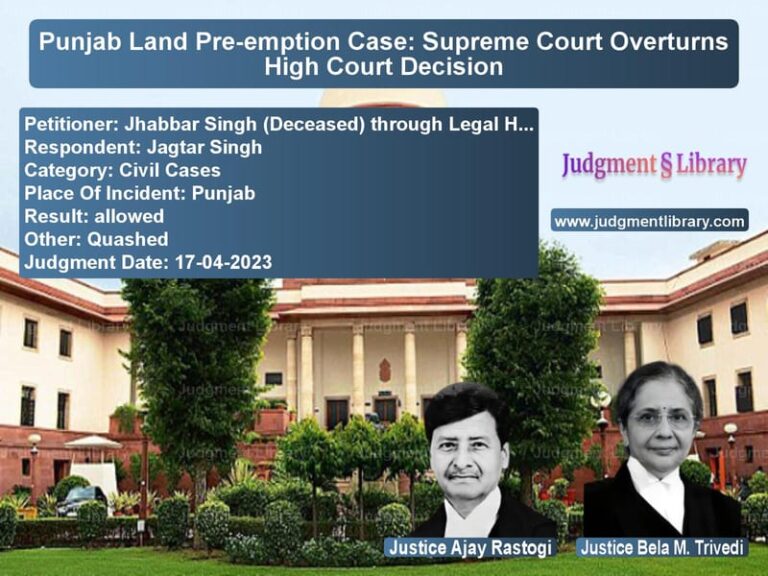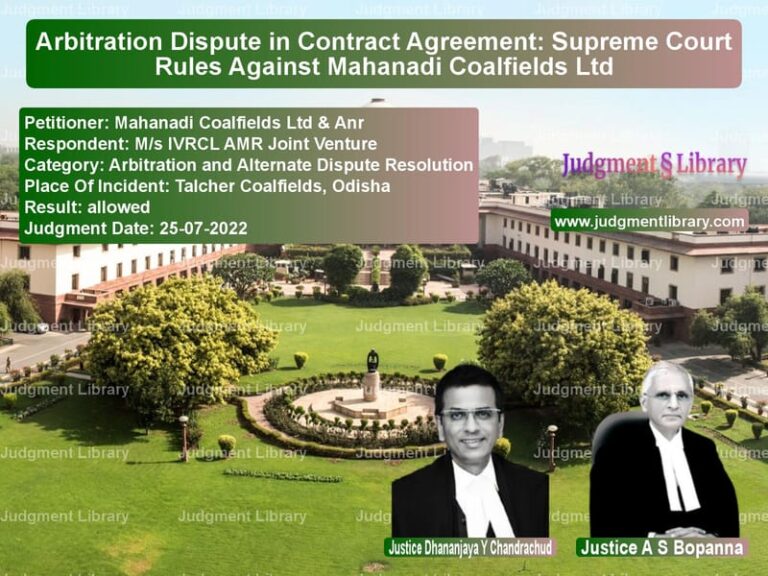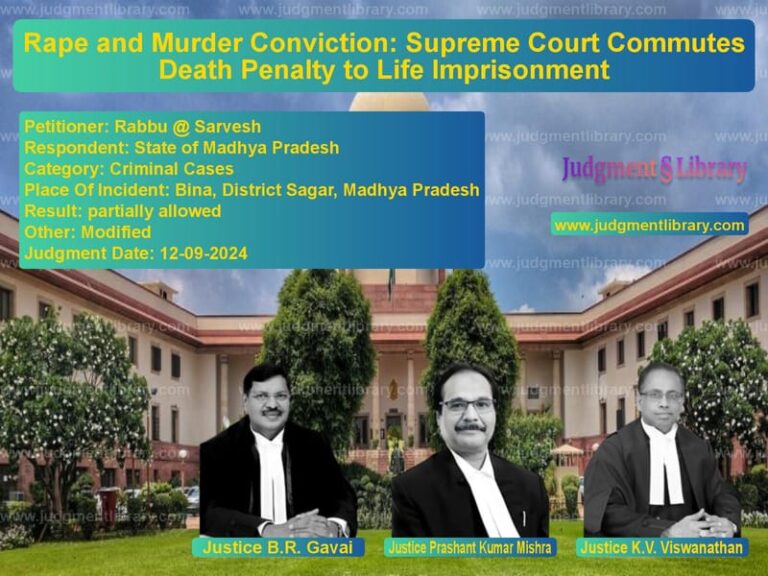Rajasthan Teacher Recruitment Dispute: Supreme Court’s Landmark Ruling on Bonus Marks and Prospective Overruling
The case of The State of Rajasthan v. Nemi Chand Mahela & Others was a crucial legal battle over the constitutionality of awarding bonus marks to candidates applying for Primary School Teacher positions in Rajasthan. This dispute, which began in 1998-99, culminated in a Supreme Court ruling that not only struck down the controversial selection process but also reinforced the principle of prospective overruling.
The litigation arose from differing opinions on whether appointments made under the unconstitutional policy should be reversed and how prospective overruling should be applied to affected candidates. The judgment provided much-needed clarity on these legal issues, ensuring that justice was served while maintaining administrative stability.
Background of the Case
The Government of Rajasthan introduced a policy granting bonus marks to candidates based on their residency in specific districts and rural areas. The intention behind this policy was to promote local representation in government employment. However, the policy faced widespread criticism for violating constitutional principles of equal opportunity.
A Full Bench of the Rajasthan High Court in Kailash Chand Sharma v. State of Rajasthan declared the bonus marks policy unconstitutional. The ruling was based on the premise that providing an advantage in public employment based on place of birth or residence violated the fundamental rights enshrined in the Constitution.
Following this decision, multiple candidates who had been denied selection due to the bonus marks system approached the courts, leading to conflicting decisions from different benches of the High Court. The matter eventually reached the Supreme Court for final adjudication.
Legal Issues Before the Court
- Whether appointments made under the unconstitutional bonus marks policy should be invalidated.
- Whether candidates who did not file writ petitions before the original High Court ruling should benefit from recalculations of merit lists.
- How the principle of prospective overruling should be applied in this context.
Petitioner’s Arguments
The State of Rajasthan, representing the petitioner, put forth the following key arguments:
- The bonus marks policy violated constitutional principles by granting preferential treatment based on residency.
- The ruling in Kailash Chand Sharma was binding and must be uniformly applied to all cases.
- The principle of prospective overruling should be strictly limited to candidates who had filed writ petitions before the High Court decision.
- Extending relief to candidates who approached the court later would create administrative chaos and legal uncertainty.
Respondent’s Arguments
The respondents, primarily candidates who had been affected by the unconstitutional policy, countered with the following arguments:
- The unconstitutional policy had unfairly deprived many deserving candidates of employment opportunities.
- The ruling should be applied uniformly to ensure fairness among all affected candidates.
- Appointments made based on an unconstitutional policy should be revisited to rectify past mistakes.
- Denying relief to those who filed petitions later would be arbitrary and unjust.
Supreme Court’s Observations
The Supreme Court delved into the complexities of the case, particularly focusing on the application of prospective overruling. The Court reiterated that while unconstitutional policies must be struck down, their retrospective invalidation could lead to administrative instability.
The Court made the following key observations:
- Appointments made before 18th November 1999 (the date of the High Court ruling) should not be disturbed.
- Only candidates who had filed writ petitions before 18th November 1999 were entitled to relief.
- Candidates who approached the court after the High Court ruling were not eligible for recalculations or fresh appointments.
- The doctrine of prospective overruling was applicable, meaning that only ongoing and future cases should be affected by the ruling.
Key Judgment Excerpt:
“Considering the need to balance competing claims and the application of prospective overruling, we direct that appointments made before 18-11-1999 shall remain unaffected. Only petitioners who challenged the selection process before this date shall be entitled to relief.”
Impact of the Judgment
The Supreme Court’s ruling had far-reaching implications for government job selection processes across India. The key takeaways from the judgment include:
- Reaffirmation of Equal Opportunity: The ruling reinforced the constitutional principle that public employment must be based on merit and should not be influenced by place of residence.
- Limitations on Retrospective Relief: By restricting relief to candidates who had filed timely writ petitions, the Court prevented widespread administrative disruption.
- Clarification on Prospective Overruling: The judgment provided a clear framework for applying prospective overruling in similar cases, ensuring consistency in legal interpretations.
Conclusion
The Supreme Court’s decision in The State of Rajasthan v. Nemi Chand Mahela & Others brought much-needed clarity to a long-standing legal dispute. By upholding the fundamental principles of equal opportunity and legal certainty, the Court struck a balance between correcting past injustices and maintaining administrative stability.
This ruling serves as a precedent for future cases involving unconstitutional selection criteria and highlights the importance of timely legal challenges in matters of public employment.
Petitioner Name: The State of Rajasthan.Respondent Name: Nemi Chand Mahela & Others.Judgment By: Justice L. Nageswara Rao, Justice Sanjiv Khanna.Place Of Incident: Rajasthan.Judgment Date: 30-04-2019.
Don’t miss out on the full details! Download the complete judgment in PDF format below and gain valuable insights instantly!
Download Judgment: The State of Rajasth vs Nemi Chand Mahela & Supreme Court of India Judgment Dated 30-04-2019.pdf
Direct Downlaod Judgment: Direct downlaod this Judgment
See all petitions in Recruitment Policies
See all petitions in Public Sector Employees
See all petitions in Employment Disputes
See all petitions in Judgment by L. Nageswara Rao
See all petitions in Judgment by Sanjiv Khanna
See all petitions in dismissed
See all petitions in supreme court of India judgments April 2019
See all petitions in 2019 judgments
See all posts in Service Matters Category
See all allowed petitions in Service Matters Category
See all Dismissed petitions in Service Matters Category
See all partially allowed petitions in Service Matters Category







